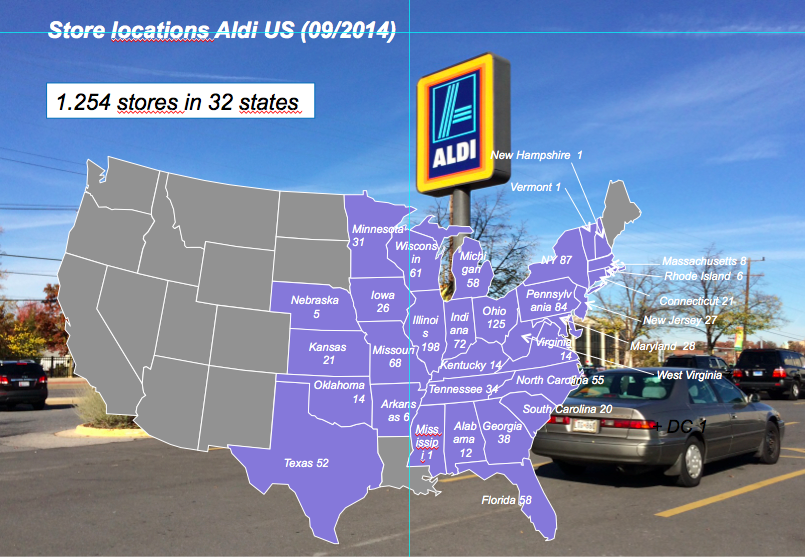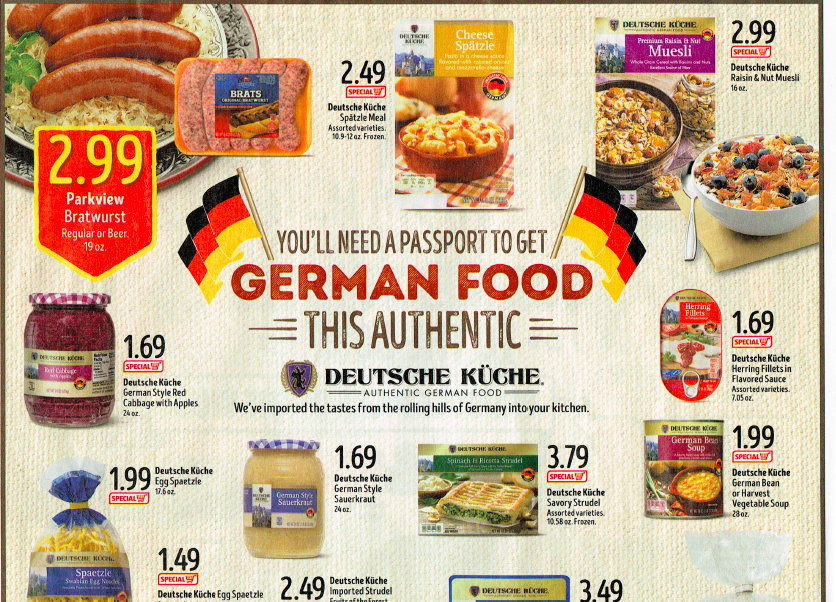
Aldi’s expansion in the United States
Recently, American newspapers published articles suggesting that Aldi would take over Bottom Dollar Food. The American discounter gives up, at the same time Aldi follows its expansion goal. On the other side, Lidl, Aldi’s main competitor in Germany announced its plan for a possible roll-out in the United States.
Aldi in the United States – A cheap prices profile
In September 2014, I wrote about Aldi and Trader Joe’s success stories. Since then, Aldi opened a few more stores but is still absent from the western part of the United States. When reading papers about Aldi, it is obvious that views on the German discounter are reduced to a cheap prices store. They mostly don’t mention hidden brands, high quality of the products or the non food weekly promotions. But Aldi is not only selling no names. I bought last year a Barbie doll and a Bosch toy workbench at Aldi. Cereals are not branded but they taste like General Mills’ and boxes look like General Mills’. Nothing surprising for Germans or regular customers. However, this knowledge still has to be discovered by Americans.
So does Aldi need to sharpen its profile?
Aldi is geographically expanding in the US. Is it so important to sharpen its positioning right now?
I moved as a student from France to Germany. I remember very well my first shopping at Aldi. I was a little bit ashamed and extremely biased about what I heard about Aldi. I can also remember checking the sales check once back home. First because the cashier had been typing prices so fast. Second because I couldn’t believe how cheap it was. I was pretty sure he had mis-typed prices to my disadvantage. Of course he hadn’t.
Later in the 90’s, I used to work for a French company named Bongrain. I learned then that famous brands, and so did the company I was working for, discreetly produced for discounters. Aldi and Norma, another German discount chain, were the main clients of one of its production plant. Some cheese had been renamed and packed in another kind of box. Others had been exclusively developed for discounters. Aldi was already famous at this time for its high quality standards which were far above classic retail.
Today, 20 years later, almost every German goes shopping to Aldi. German people know that Aldi is equal to top quality at low prices. Exactly this sentence, “Top quality at low prices“, is Aldi’s American slogan. Even though Aldi’s regular customers are aware ot it, there is still a huge communication gap to fill in.
Lidl challenges Aldi in the United States
German newspapers wrote during the holidays that Lidl, another huge German discount chain, decided to challenge Aldi in the US. I couldn’t stop thinking why French retailers are not present there. Carrefour gave up in the early 90’s. Same for Auchan. Intermarché, Leclerc, Hyper U and others never tried. Well, Edeka and Rewe are not there too. But the uniqueness of Aldi, the export of processes, works. Why doesn’t French retail dare to come on the American market? And why isn’t there one single French supermarket in Germany anymore? The answer is an insufficient profitability.
I learned in over 20 years of business that companies make almost always the same big mistake: they want to export worldwide a locally successful concept and forget to do a basic market research. It does not work like that. Know your market. Adapt and not only name and packaging. Add a value. Invest in awareness and distribution. These are key factors of success in France, Germany or in the United States.
Aldi exports its innovative retail processes and is for Americans an American brand. Today, it focuses on POS rise. It should keep on its success track. And Lidl can clearly carve out its own niche.





Please put a store in Camden, SC. Thank you
Thank you Janice. I guess Camden is already one of the 20 stores in SC? If not, I updated the map in this blogpost http://www.howtoguide.org/was-konnen-wir-von-lidl-in-den-usa-erwarten/. I wrote it in German but if you click on the map, you can see details in English.